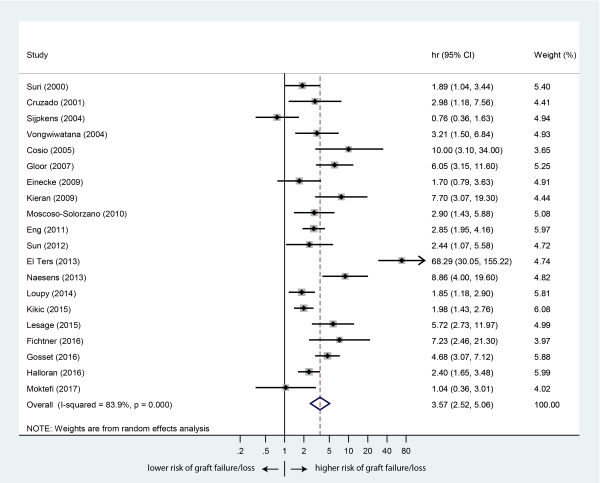The Association between Transplant Glomerulopathy and Graft Outcomes among Patients Undergoing Kidney Transplantation: Results of a Meta-Analysis
G. Kovács,1 G. Devercelli,2 Z. Vokó,1,3 T. Zelei,1 I. Hirji,2 P. Keown.4,5
1Syreon Research Institute, Budapest, Hungary
2Shire, Lexington, MA
3Health Policy & Health Economics, Eötvös Loránd University, Budapest, Hungary
4Syreon Corporation, Vancouver, BC, Canada
5University of British Columbia, Vancouver, BC, Canada.
Meeting: 2018 American Transplant Congress
Abstract number: D106
Keywords: Graft failure, Kidney transplantation, Meta-analysis
Session Information
Session Name: Poster Session D: Kidney Complications: Late Graft Failure
Session Type: Poster Session
Date: Tuesday, June 5, 2018
Session Time: 6:00pm-7:00pm
 Presentation Time: 6:00pm-7:00pm
Presentation Time: 6:00pm-7:00pm
Location: Hall 4EF
Transplant glomerulopathy (TG) can lead to irreversible kidney damage. TG is recognized as a surrogate marker for poor outcomes, including graft failure and loss among patients undergoing kidney transplantation. To quantify the association between TG and graft outcomes, a meta-analysis of publications identified through a systematic literature review was conducted. English-language publications available through July 1, 2017 were identified and reviewed. Graft outcomes included: (1) graft loss reported as graft loss or death and (2) graft failure reported as a combination of graft loss and laboratory changes indicating graft dysfunction. The meta-analysis summarized extracted data using hazard ratios (HR) and 95% confidence intervals (CIs) to measure the association between TG and graft outcomes. Sensitivity analyses evaluated this association within prespecified sub-groups. Meta-regression was used to identify factors to explain observed heterogeneity, including mean time between transplantation and biopsy, age and gender distribution. 20 publications, including more than 5600 patients, were identified as eligible for data extraction, as they assessed the relationship between TG and graft loss or failure among patients with and without TG. Of these studies (Figure), which were highly heterogeneous (I2=83.9%), the combined HR was 3.57 (95% CI 2.52-5.06), indicating that TG had a significant negative effect on graft survival. This finding was consistent in all subgroups. The results suggested that the negative effect may increase as time from transplantation to biopsy increases (p=0.063). The relationship between TG and graft failure is significant with a greater risk of graft loss and failure among patients who develop TG compared to those without TG, emphasizing the importance of preventing or delaying the onset of TG in kidney transplant patients.
CITATION INFORMATION: Kovács G., Devercelli G., Vokó Z., Zelei T., Hirji I., Keown P. The Association between Transplant Glomerulopathy and Graft Outcomes among Patients Undergoing Kidney Transplantation: Results of a Meta-Analysis Am J Transplant. 2017;17 (suppl 3).
To cite this abstract in AMA style:
Kovács G, Devercelli G, Vokó Z, Zelei T, Hirji I, Keown P. The Association between Transplant Glomerulopathy and Graft Outcomes among Patients Undergoing Kidney Transplantation: Results of a Meta-Analysis [abstract]. https://atcmeetingabstracts.com/abstract/the-association-between-transplant-glomerulopathy-and-graft-outcomes-among-patients-undergoing-kidney-transplantation-results-of-a-meta-analysis/. Accessed February 19, 2026.« Back to 2018 American Transplant Congress

